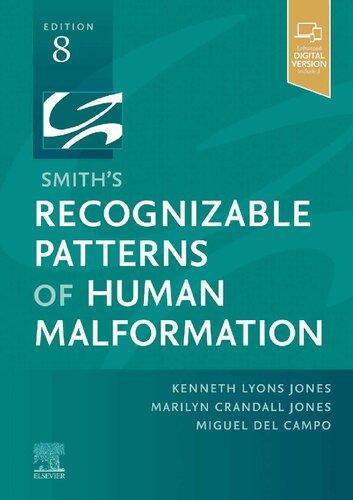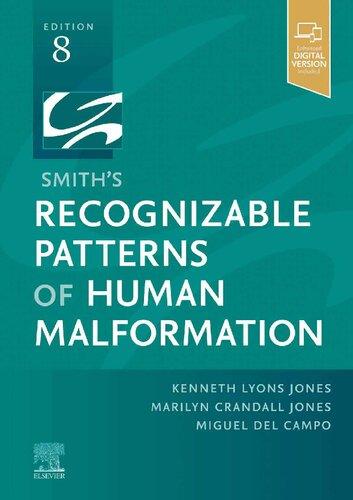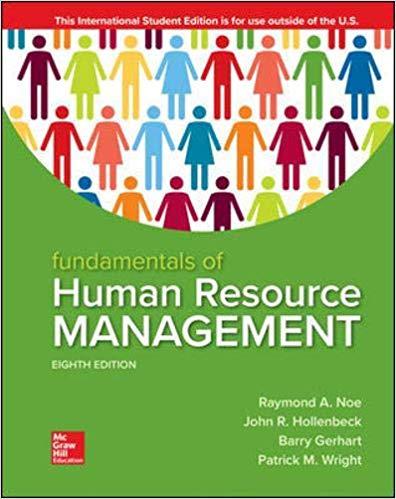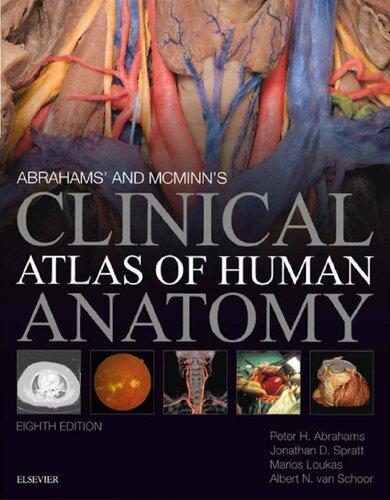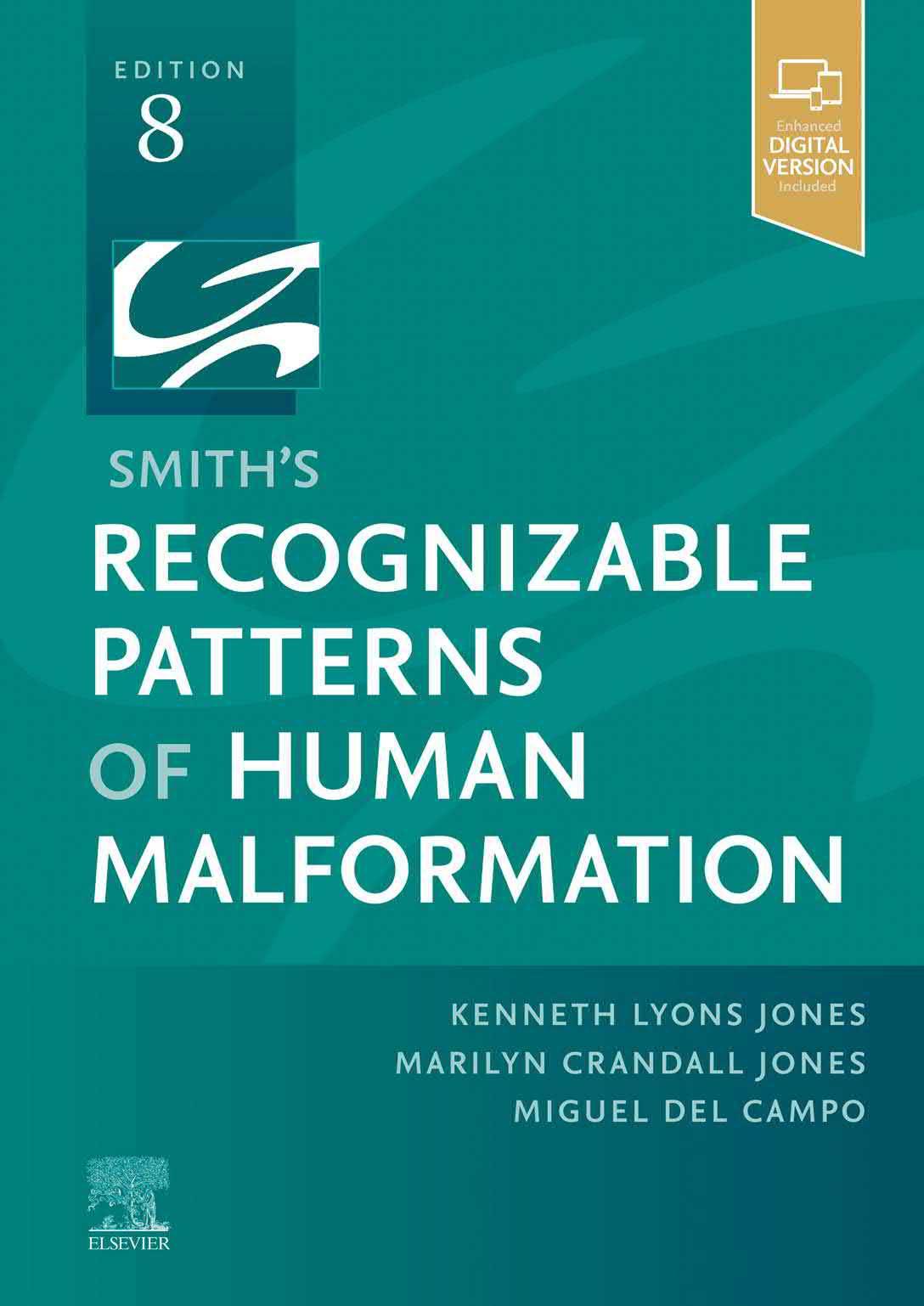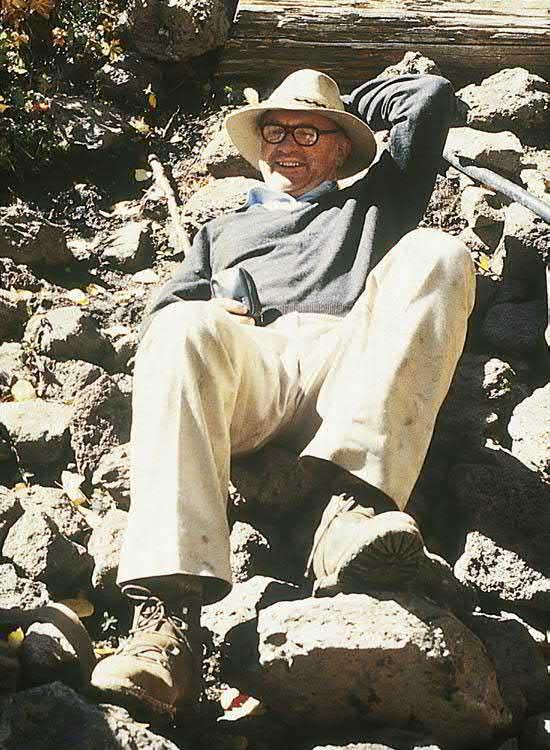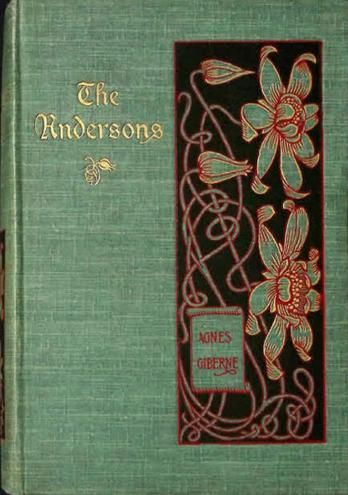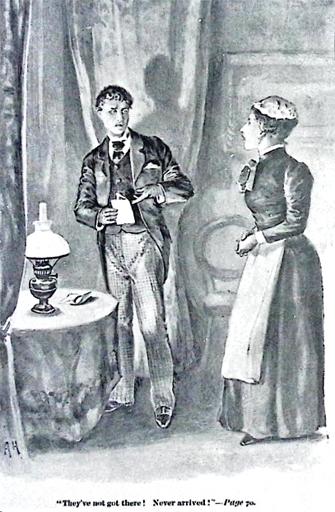SMITH’S RECOGNIZABLE PATTERNS OF HUMAN MALFORMATION
KENNETH LYONS JONES, MD
Professor of Pediatrics, Chief, Division of Dysmorphology and Teratology, University of California, San Diego, School of Medicine, La Jolla, California
MARILYN CRANDALL JONES, MD
Professor of Clinical Pediatrics, Department of Pediatrics, University of California, San Diego, School of Medicine, La Jolla, California; Clinical Service Chief, Division of Genetics, Rady Children’s Hospital, San Diego, California
MIGUEL DEL CAMPO, MD, P h D
Professor of Clinical Pediatrics, Department of Pediatrics, University of California San Diego, and Rady Children’s Hospital San Diego, San Diego, California
Elsevier
1600 John F. Kennedy Blvd. Ste 1800 Philadelphia, PA 19103-2899
SMITH’S RECOGNIZABLE PATTERNS OF HUMAN MALFORMATION, EIGHTH EDITION
Copyright © 2022 by Elsevier, Inc. All rights reserved.
ISBN: 978-0-323-63882-1
No part of this publication may be reproduced or transmitted in any form or by any means, electronic or mechanical, including photocopying, recording, or any information storage and retrieval system, without permission in writing from the publisher. Details on how to seek permission, further information about the Publisher’s permissions policies and our arrangements with organizations such as the Copyright Clearance Center and the Copyright Licensing Agency, can be found at our website: www.elsevier.com/permissions
This book and the individual contributions contained in it are protected under copyright by the Publisher (other than as may be noted herein).
Notice
Practitioners and researchers must always rely on their own experience and knowledge in evaluating and using any information, methods, compounds or experiments described herein. Because of rapid advances in the medical sciences, in particular, independent verification of diagnoses and drug dosages should be made. To the fullest extent of the law, no responsibility is assumed by Elsevier, authors, editors or contributors for any injury and/or damage to persons or property as a matter of products liability, negligence or otherwise, or from any use or operation of any methods, products, instructions, or ideas contained in the material herein.
Previous editions copyrighted 2013, 2006, 1997, 1988, 1982, 1976, 1970.
Library of Congress Control Number: 2020952398
Content Strategist: Sarah Barth
Content Development Manager: Kathryn DeFrancesco
Content Development Specialist: Joanie Milnes
Publishing Services Manager: Shereen Jameel
Senior Project Manager: Karthikeyan Murthy
Design Direction: Renee Duenow
Printed in India
Last digit is the print number: 9 8 7 6 5 4 3 2 1
Dedication to the First Edition
To my wife, Ann, beloved inspirational companion
To my father, William H. Smith, accomplished engineer and would-be physician
To my teachers, Dr. Lawson Wilkins, molder of clinicians and humanist, and Professor Dr. Gian Töndury, complete anatomist, who brings embryology into living perspective
This page intentionally left blank
Dedicated to the Memory of David W. Smith, MD 1926–1981
“Far better it is to dare mighty things, to win glorious triumphs, even though checkered by failure, than to take rank with those poor spirits who neither enjoy much nor suffer much, because they live in the great twilight that knows neither victory nor defeat.”
Theodore Roosevelt, in a speech before the Hamilton Club, Chicago, April 10, 1899
The information set forth in this book represents an amalgamation of the knowledge, commitment, and hard work of many individuals. We would like to acknowledge a number of those who have made significant contributions to the development of this book:
Dr. Kurt Benirschke’s breadth of knowledge, intellectual curiosity, and wisdom acted as a continuing stimulus for us. We will miss him greatly.
Dr. Christina D. Chambers’ enthusiasm, creativity, and understanding of epidemiology have made me aware of a totally new approach to understanding the causes of birth defects.
Dr. Robert J. Gorlin and Dr. David L. Rimoin had a substantial influence on the thinking that went into this book. Both were great scientists and clinicians who had a significant impact on our field. We will miss them incredibly.
Dr. del Campo would like to acknowledge Dr. Alfredo Garcia-Alix Perez for his constant inspiration for my understanding of birth defects and Dr. Luis Alberto Perez Jurado for his teaching and constant support in my professional development in clinical genetics.
We are grateful to the following fellows in dysmorphology/genetics at the University of California, San Diego: Dr. H. Eugene Hoyme, Sanford School of Medicine, University of South Dakota and the University of Arizona, Tucson; Dr. Luther K. Robinson, State University of New York, Buffalo; Dr. Ronald Lacro, Children’s Hospital of Boston; Dr. Christopher Cunniff, Weill Cornell Medical College, New York, Dr. Rick Martin, Shire Human Genetic Therapies, Cambridge, Massachusetts; Dr. Leah W. Burke, University of Vermont; Dr. Stephen R. Braddock, St Louis University School of Medicine; Dr. Lynne M. Bird, University of California, San Diego; Dr. Kenjiro Kosaki, Keio University, Tokyo; Dr. Mary J. Willis, Balboa Naval Hospital, San Diego; Dr. Keith Vaux, University of
California, San Diego; Dr. Kristen Wigby, University of California, San Diego; Dr. Carolina Galarreta, Valley Children’s Hospital Madera, CA. Each has made his or her own significant contribution to the development of this book.
Many colleagues have contributed photos, information, and expertise. Especially helpful have been Dr. John Carey, University of Utah School of Medicine; Dr. Michael Cohen, Jr., Dalhousie University, Halifax, Nova Scotia; Dr. Judith Hall, University of British Columbia, Vancouver; Dr. Jaime Frias, Centers for Disease Control and Prevention; Dr. Jon Aase, University of New Mexico; Dr. Bryan Hall, University of Kentucky, Lexington; Dr. James Hanson, University of Iowa; Dr. Sterling Clarren, University of Washington School of Medicine; Dr. John Graham, Cedars-Sinai Medical Center, Los Angeles; Dr. Margot Van Allen, University of British Columbia, Vancouver; Dr. Cynthia Curry, University of California, San Francisco; Dr. Roger Stevenson, Greenwood Genetic Center, Greenwood, South Carolina; Dr. Buzz Chernoff, Sacramento; Dr. Jeffrey Golden, Harvard Medical School; Dr. Mike Bamshad, University of Washington; Dr. David Weaver, Indiana University School of Medicine; Dr. Jules Leroy, Ghent University Hospital, Ghent, Belgium; Dr. Mark Stephan, University of Washington School of Medicine; Dr. Margaret Adam, University of Washington; Dr. Art Aylsworth, University of North Carolina; Dr. Melanie Manning, Stanford University, Palo Alto; Dr. Angela Lin, Massachusetts General Hospital; Dr. Carol Clericuzio, University of New Mexico; Dr. Ian Krantz, Children’s Hospital of Philadelphia; Dr. Maximilian Muenke, National Institutes of Health; Dr. Kosuke Izumi, Children’s Hospital of Philadelphia; Dr. Raoul Hennekam, University of Amsterdam, Netherlands; Dr. Alain Verloes, Robert-Debre Hospital, France; Dr. Vanesa Lopez Gonzalez, Hospital Clinico Universitario Virgen de la Arrixaca-IMIB, Spain.
G Unusual Brain and/or Neuromuscular Findings with Associated Defects
H Facial Defects as Major Feature
I Facial-Limb Defects as Major Feature
Campomelic Dysplasia 482
Achondroplasia 484
Hypochondroplasia 492
Pseudoachondroplasia 494
Acromesomelic Dysplasia 498
Spondyloepiphyseal Dysplasia Congenita 502
Kniest Dysplasia 506
Dyggve-Melchior- Clausen Syndrome 508
Spondylometaphyseal Dysplasia, Kozlowski Type 510
Metatropic Dysplasia 512
Geleophysic Dysplasia 516
Chondroectodermal Dysplasia 518
Diastrophic Dysplasia 520
X-Linked Recessive Spondyloepiphyseal Dysplasia Tarda 522
Multiple Epiphyseal Dysplasia 524
Metaphyseal Dysplasia, Schmid Type 526
Metaphyseal Dysplasia, McKusick Type 528
Chondrodysplasia Punctata, X-Linked Dominant Type 530
Autosomal Recessive Chondrodysplasia
Hypophosphatasia 536 Hajdu- Cheney Syndrome 538
Craniometaphyseal Dysplasia 542
Oto-Palato-Digital Syndrome, Type I 544
Oto-Palato-Digital Syndrome, Type II 546
Melnick-Needles Syndrome 550
Frontometaphyseal Dysplasia 554
L Osteochondrodysplasia with Osteopetrosis
Osteopetrosis: Autosomal Recessive— Lethal 558
Lenz-Majewski Hyperostosis Syndrome 562
Pyknodysostosis
M
Craniosynostosis Syndromes
Syndrome 586 Craniofrontonasal Dysplasia 588
Syndrome 592 Greig Cephalopolysyndactyly Syndrome 594 Antley-Bixler Syndrome 596 Baller- Gerold Syndrome 598
N Other Skeletal Dysplasias
O Storage Disorders
P Connective Tissue Disorders
Q Hamartoses
R Ectodermal Dysplasias
Hypohidrotic Ectodermal Dysplasia 760
TP-63 Related Ectodermal Dysplasia 764
Finlay-Marks Syndrome 768
Tricho-Dento- Osseous Syndrome 770
Clouston Syndrome 772
Cranioectodermal Dysplasia 774
GAPO Syndrome 778
Pachyonychia Congenita Syndrome 780
Senter-KID Syndrome 782
S Environmental Agents
Fetal Alcohol Spectrum Disorders 786
Fetal Hydantoin Syndrome 792
Fetal Valproate Syndrome 794
Fetal Warfarin Syndrome 796
Fetal Aminopterin/Methotrexate Syndrome 798
Retinoic Acid Embryopathy 800
Methimazole/Carbimazole Embryopathy 802
Mycophenolate Mofetil Embryopathy 804
Fetal Varicella Syndrome 806
Hyperthermia-Induced Spectrum of Defects 808
Congenital Zika Syndrome 812
T Miscellaneous Syndromes
Coffin-Siris Syndrome 816
Börjeson-Forssman-Lehmann Syndrome 820
Alagille Syndrome 822
Bardet-Biedl Syndrome 826
Wiedemann–Steiner Syndrome 830
Axenfeld-Rieger Syndrome 834
Peters-Plus Syndrome 838
Mowat-Wilson Syndrome 840
Cerebro- Costo-Mandibular Syndrome 844
Jarcho-Levin Syndrome 848
Berardinelli-Seip Congenital Lipodystrophy Syndrome 852
Kosaki Overgrowth Syndrome 854
Distichiasis-Lymphedema Syndrome 856
Hennekam Lymphedema-Lymphangiectasia Syndrome 858
Vici Syndrome 864
U Miscellaneous Sequences
Laterality Sequences 866
Holoprosencephaly Sequence 870
Meningomyelocele, Anencephaly, Iniencephaly Sequences 874
Occult Spinal Dysraphism Sequence 878
Septo- Optic Dysplasia Sequence 880
Klippel-Feil Sequence 882
Early Urethral Obstruction Sequence 884
Exstrophy of Bladder Sequence 886
Exstrophy of Cloaca Sequence 888
Urorectal Septum Malformation Sequence 890
Oligohydramnios Sequence 892
Sirenomelia Sequence 894
Caudal Dysplasia Sequence 896
Amnion Rupture Sequence 898
Limb–Body Wall Complex 902
V Spectra of Defects
Oculo-Auriculo-Vertebral Spectrum 904
Oromandibular-Limb Hypogenesis Spectrum 908
Congenital Microgastria–Limb Reduction Complex 910
Sternal Malformation–Vascular Dysplasia Spectrum 912
Monozygotic Twinning and Structural Defects—General 914
W Miscellaneous Associations
VACTERL Association 922 MURCS Association 926
CHAPTER 2
Genetics, Genetic Counseling, and Prevention 929
CHAPTER 3
Minor Anomalies: Clues to More Serious Problems and to the Recognition of Malformation Syndromes 955
CHAPTER 4
I
Another random document with no related content on Scribd:
THE ANDERSONS:
Brother and Sister.
CHAPTER I.
IN BRIGHTON LODGINGS.
"IT doesn't matter! That's to say, it can't be helped. I wouldn't have done the same in your place, Sissie. But perhaps you were right. I don't know exactly how we should
have managed. I don't mean to be indebted to him or to anybody. I have my own way to make in the world; and I mean to make it. I'll get on—somehow."
The words were spoken resolutely, and the speaker, a lad of about seventeen or eighteen, gave a slight toss to his head, which shook back a loose lock of hair, given to dropping over the brow. It was a gesture characteristic of Felix Anderson. He was a good-looking young fellow, not tall but well-made, with a resolute square jaw.
"I mean to get on, and I will," he repeated. "Anybody can who chooses. I have to begin at the bottom of the ladder: but that's no reason why I shouldn't got to the top some day. Anyhow, I don't mean to be easily beaten. If I take this thing now, it is only as a stepping-stone to something better. I shall not be a bookseller's accountant all my days."
There was a touch of egoism in all this, but egoism is almost an essential part of youth, and the boy was thinking of others besides himself. "I wouldn't have written to Dr. Bryant in your place,—after the way he treated my father and your mother. But if you thought it best—"
"I could not see what else to do. It is hard enough to ask help of anybody. For myself I would not—only for you and Lettice."
"Not for me. I can do without him, thank goodness! I wouldn't touch a dirty penny of the old fellow's with a pair of tongs! Not for anything you could mention," declared Felix, with unnecessary vehemence. "It is different for you and Lettice. Not that I couldn't have kept you both."
"On seventeen shillings and sixpence a week! Forty-five pounds a year!"
"It will be a pound a week soon. Besides, I shall make more somehow. Something would have turned up," said Felix, with juvenile hopefulness. "And in time, you will be able to teach again,—not a great deal so as to knock yourself up, but enough to be a help. I mean to have a home for you both before long."
The faded woman, lying on a sofa near the fire—faded, though scarcely thirty-five in age—knew better. She was too well aware that the prospective home would not be for her.
It was a shabby little room: a most ordinary specimen of a second-rate lodging-house "parlour" in a dull back street of Brighton. Yet there was about it a certain refinement of air and tone. Cecilia Anderson was a lady, both by birth and by education: and her personality told upon her surroundings. Rows of well-bound books spoke of better days: and a graceful arrangement of moss and ferns gave evidence of somebody's love for beauty. Moreover, the three present, though to some extent shabby, were also scrupulously neat; and while work lay about, it was not flung about: and neither table-cloth nor carpet was bestrewn with the shreds of white cotton, too often seen in the wake of tasteless females.
Lettice had not spoken yet. She knew well that Felix's opinion, not hers, was the important question, even though her future might be more acutely affected than his by the correspondence between Miss Anderson and Dr. Bryant. Not being self-assertive, she was in no haste to thrust herself into the discussion, but sat quietly, work in hand, glancing between the stitches from one to the other.
"What did uncle Bryant do?" she at length asked, in the rather long silence following her brother's last words.
"He's not your uncle,—or mine."
"He is Sissie's,—" with a glance at Miss Anderson.
"And what is mine is yours, of course," added Cecilia Anderson.
"Oh, well—but you can't make a thing to be, when it isn't," rejoined Felix. "He's no scrap of relation to Lettice or me, you know—really and he must have behaved abominably to your mother."
"What did he do?" persisted Lettice.
"He objected to my mother's marriage. I suppose there were hot words spoken—as usual, in family quarrels. I am not sure about the 'behaving abominably.' He tried to prevent what he did not think would be for her happiness. My mother had her way,—and there was no further intercourse between them."
"And you to write to him—after all these years!"
"That is it! So many years and years ago;—before I was born! My uncle must be quite an elderly man now. I don't think one ought to make too much of things spoken so very long since! He thought he was in the right,—and he did not really know our father. At least, he never learnt to love him. That is what I mean. It is all over now; and one has to forget sometimes. And he is my uncle. Better to be helped by him than by strangers."
"I wonder why Dr. Bryant didn't like your mother to marry papa," Lettice conjectured dreamily. "Did anybody mind our mother marrying him?"
"People sometimes take fancies—unreasonable fancies. Dr. Bryant was always strong in his dislikes, I have been told. Mind, Lettice, you know now all that there is any need for you to know. You are not to ask any more questions, and you are never to discuss the matter with my uncle."
"No." The word came slowly, and Lettice's eyes widened into a thoughtful gaze, her needle lying neglected. She had a somewhat childish look for her fifteen years; and her small-featured pale face scarcely told of the firm nerves or indomitable pluck of her brother and half-sister. Yet it was a happy face, contented and cheery: and the girl, if of more sensitive make than they, was capable of resolute effort, and of patient endurance, though as yet she had not been greatly called upon for the exercise of either.
Cecilia Anderson was a woman of remarkable force and courage. She had been practically a mother to Felix and Lettice, since the death of their own mother, when Lettice was only six months old: and from the death of their father —hers and theirs also—whereby they were at once reduced from ease to penury, she had borne up with unfailing determination.
Not only by her exertions had she made a home for the two children, and given them thus far a good education: but she had also paid all her father's debts—not large, perhaps, in actual amount, but very large in proportion to Cecilia's means. She knew no rest till they were liquidated: and she would have done twice as much in love to her father's memory. He had not been a gifted man, or an estimable man, or a man of high principle: but he had had the power to make all women believe in him.
Cecilia was cultivated in no common degree; thoroughly well taught, and well read: a good French and German scholar: a good musician: a passable artist: and with these powers she possessed also an unlimited capacity for work. No doubt her handsome face, her refined and dignified manner, helped her to make way. Until recently, her time had been for years more than full: and the incessant toil had been sufficiently repaid.
But of late, a change had come. She had begun slowly to drop out of the ranks of the always employed, and to find large gaps in her time, once entirely occupied. Competition in a place like Brighton is very keen: and perhaps she was wearing out physically under the long strain, not able to teach so well. She had often sat up for hours at night, correcting exercises, when her days were over-full. And even in her holidays, she had known no rest with incessant holiday-engagements. Nature will in time take its revenge.
One pupil after another dropped away; and fresh pupils no longer sprang to supply the vacant places. The worry of this told upon her severely. She could stand work, but she could not stand the absence of work. It was scarcely a year since the last of her father's debts had been paid; and she had hoped for a time of less pressure, when she might lay by a little for the future. Now, this new reverse was come!
Treading upon the heels of lessening work came soon the direful question how to get on? How to pay rent and bills, how to procure food and clothing, how to meet educational expenses?
Lettice went daily to a school near: one of the earlier modern High schools. Felix, who showed signs of considerable ability, had only left school this last Michaelmas. Cecilia idolised Felix. She loved Lettice, quietly:
but her whole heart was bound up in the boy, this young half-brother, to whom she had been sister and mother and friend, all in one, and for whose success in life she would gladly have flung away her own happiness. Once upon a time she had indulged in a wild dream of College; but this dream had faded under the stringent necessity of finding work for him, without delay.
At first she sought the "something" with ideas far too lofty of what might be expected; since, surely, there were few boys in Brighton like her Felix. Employers did not view the matter with her sisterly eyes, however; and step by step she had to descend in her notions as hope after hope faded.
Had Felix and Lettice been a little more experienced, they might have read in Cecilia tokens of the impending break-down, during the autumn term: but they did not. To the last she never complained, never gave in, never failed in a single lesson. When the collapse came, it was sudden and entire. In the morning she went out as usual: before night she was dangerously ill.
The immediate danger lasted only a few days; but recovery was fitful and slow. Cecilia at length insisted on hearing the whole truth from her doctor: and it was a truth which she had long suspected. She was the victim of complicated and hopeless disease. She might to some extent rally, and even resume ordinary life; but she would never again be strong, or fit for teaching; and at any time, an acute attack might carry her off.
Miss Anderson said not a word of this to Felix or Lettice. She thought it over quietly: and when again able to sit up, she determined to write to the only near relative she possessed—her uncle, Dr. Bryant, alienated many many
years earlier by his only sister's marriage to Francis Anderson.
This decision was hastened by an opening for Felix, as accountant in a stationer's shop. He would begin at once going daily, to learn his business: and after a fortnight, would receive the sum of 17s. 6d. weekly, with prospects of an early rise, if he gave satisfaction. Cecilia had looked for something widely different, but others told her how fortunate he was; and the commonsense of the boy acquiesced. Cecilia gave in, and wrote to Dr. Bryant, resolved that Felix should at least, if possible, be unhampered.
The reply was prompt. If Cecilia would travel down to the west with Lettice, as soon as she could bear the journey, Dr. Bryant would give them both a home. To meet immediate expenses, he enclosed a £10 note. The letter was not in style affectionate, but Maurice Bryant never had written affectionately. Some people, demonstrative in manner, are icy by post; and some, who never thaw in personal intercourse, are unexpectedly genial in correspondence. He might be none the less warm, because he expressed himself coldly.
On the whole, satisfaction predominated in Cecilia's mind. To be compelled to seek aid from any one was a source of distress; but she was not a person of puny make, always in arms against imaginary slights, neither was she herself demonstrative. Why should she expect a show of feeling from others?
"We will offer you a home!" Dr. Bryant wrote, and she wondered over the plural pronoun. She had always thought of her uncle as an old bachelor, possibly an eccentric one: but he might have married, without the fact reaching her
ears. If so, the future happiness of herself and Lettice would depend greatly upon the manner of wife he had chosen.
Cecilia was not a woman of many friends, using the word in a sense which implies intimacy—partly in consequence of her innate reserve, partly because she held back from possible friendships. She was proud as well as reserved; and she would not endure to have it said that she went after anybody with an object. Neither would she permit towards herself kindness which might border on patronage. Even the families of long-standing pupils would drop away, when the engagement ended. People admired and respected Miss Anderson, but few loved her; and all her thought and care were concentrated in Felix and Lettice— more especially in Felix.
So when these troubles came, she had no one to turn to for help: none except the lodging-house keeper, Mrs. Crofton, who, like everybody, admired and respected her lodger, and who would have done anything in the world for Lettice. Mrs. Crofton did do much; nursing the invalid night and day through the worst of the illness, and afterward sparing every possible moment from work to the sick room.
The doctor, summoned at haphazard from a neighbouring street, was kindness itself: and the clergyman of the parish called often. But though Miss Anderson had been years in this house, she was a stranger to both of them. Despite all their efforts to break through her shield of reticence, she and they remained "strangers yet." Nor was she so grateful as she might have been for their exertions on behalf of Felix, since the result meant to herself deep disappointment.
"I have been talking with Mrs. Crofton about you, Felix; and we both wish you to stay on here, when Lettice and I
are gone."
"If I can afford it." Felix did not seem enamoured with the plan. Freedom had its charms for him, and he might be more free elsewhere.
"She will let you have the top back bedroom for half-acrown a week, and will do everything for you. It would be impossible to get a furnished room anywhere else for so little."
"Ten shillings a month. About six pounds a year. I could manage that, of course. But I say, Sis—" and the lad flushed up hotly; "will it repay her?"
"She says so. I did hesitate—and I told her it ought at least to be more in the season: but she would not listen. She declares that she owes us a great deal, and perhaps it is true. We have never been behindhand, all these years, in our rent; and of course I have done her many little kindnesses. By-and-by, it may be in your power to repay her more fully."
"I hate to be indebted to anybody."
"Yes, I know!—" with full understanding. While Lettice glanced uncomprehendingly from one to the other. "But Mrs. Crofton is a good creature. I would rather be indebted to her than to most people. And the room is not bad—it is neatly furnished, and only one side of the ceiling slants. I told her the plan would be a comfort to me."
"Oh, it will do as well as anything. I just have to get along for the present. I don't mean to be in a shop all my days—or in a garret bedroom."
"You won't—I am sure. It would make me wretched to think so."
"I shall not. I'll get on, somehow. I mean to get on. The chance will come to me, and I shall use it. You'll see."
Would she see? Or would she soon be far-away, beyond reach of this idolised brother?
The question came acutely, bringing a shadow with it. For no brightness lay in the thought. Neither by bringing-up nor by after-conviction was Cecilia in any sense a religious woman. She had a philosophical way of viewing troubles, and a spirited fashion of making the best of things: and what was inevitable she would accept courageously. But death for her meant simply being cut off from her dearest ones—above and beyond all, from Felix! The land on the other side of the grave was, for her, not a Paradise of joy and reunion, but a blank existence of absence and forgetfulness. All her energies had been expended on this life: all her treasure was lodged in this world. She had only a faint confidence in a vague "Providence" to help her through the last straggle, when it should come.
It was not exactly fear that she felt, looking forward. On the whole, she counted that she had done her duty, and that things would not go hardly with her. She had kept up a respectable show of religion, going pretty often to church on Sunday morning, if wet weather did not offer an excuse for staying at home—though no rain kept her in on other days. She had a Bible in her room: not often opened. She had been scrupulously honourable as to her father's debts; strictly true in all her dealings: a hard-working, careful, and self-denying sister. Could more be required? She dreaded having to leave all whom she loved: otherwise she was
prepared—or she thought so—to meet the last enemy bravely, as she had met many lesser enemies.
"I wish you would get me another shawl, Lettice. I am so chilly."
Lettice sprang up eagerly: rather too eagerly. A certain impulsiveness and rapidity of movement were natural to her; unlike the dignified ease which had always characterised Cecilia, and unlike the confident composure of Felix. The impulsiveness worried Cecilia, who had done her best to engraft her own manner upon the young girl, hitherto without success. They had never "suited one another," so completely as Cecilia and Felix "suited," but Lettice was scarcely aware of this fact. She was of a happy disposition, humble as to her own merits, passionately fond of Cecilia, and always sure that Cecilia was in the right.
It had become a received fact in the little circle, that Lettice, though well-meaning and affectionate, was hopelessly awkward and dull—a mere foil to her handsome and clever brother. Lettice acquiesced in this version of affairs as fully as any one. She never expected to be anything else than dull; and that her occasional gaucheries should arouse Cecilia's vexation was a matter of course. Lettice was always more annoyed with herself than Cecilia could be with her.
The hurried start to obey was a mistake. As she sprang up, she caught her foot in the rug, and stumbled against the couch—then, in her desperate effort to avoid coming down upon the invalid, she fell sideways towards the fireplace, striking her head sharply against the corner of the marble mantelpiece.
"Lettice!" Cecilia said reproachfully—aware only of the unpleasant jar she had herself received.
"You stupid child!" exclaimed Felix, with brotherly frankness.
Lettice pulled herself up slowly, and laughed—keeping her face turned away. "I'm sorry," she said, in a lively voice. "I didn't mean—I'll get the shawl—"
"Don't knock anything down by the way," said Cecilia, with some sharpness.
"O no—I'll—" Lettice laughed again, and went straight out of the room.
"Did you ever see such a child?" asked Cecilia. "And she doesn't care in the least!"
Lettice fled to the top of the first flight, and there stood still, holding the balusters. Resolution failed for the moment to carry her further. The blow had been severe enough to half-stun her, though not to overcome her courage, and tears streamed from her eyes with the pain—an involuntary overflow: muscular, not mental. Lettice would have scorned to cry for such a cause: but she was stupefied, and five minutes passed unmeasured. Then the parlour door opened for a shout:
"Lettice! What are you after? You little slowcoach! Sissie wants her shawl."
Lettice rushed to Cecilia's bedroom door, and called out, "Yes, yes, I'm coming."
"Make haste! What an age you have been!"
Lettice caught up the shawl and ran downstairs.
When she entered, the other two were again in earnest conference, and they scarcely noticed her.
Cecilia only remarked carelessly, "I do wish you would learn to be a little more attentive, Lettice;" and went on with what she was saying.
Lettice attempted no defence. She sat down, not in her former place, but well in the shade behind the couch, and made believe to be at work again.
A tap at the door was followed by the announcement,—
"Please, ma'am, Mr. Kelly wants to see you!"
"Mr. Kelly! O dear!"
"He've been a lot of times, ma'am, when you was too ill: and he said maybe you'd be able now."
"Well, I suppose he must come in for once. It is to be hoped that he will not stay long."
Felix crossed over to where Lettice sat. "I'm off," he whispered. "I'll be back in an hour. I say—you didn't really hurt yourself? I saw you got an uncommonly hard bang."
"Oh, it's nothing—" and she smiled.
"Not bad now."
"It's getting better."
"Sis didn't notice, so I said nothing. She'd only lie and bother. You'll be all the colours of the rainbow in a day or two."
Felix dashed across the room, intent on escape; and Cecilia's eyes followed him with hungry looks. She could hardly bear to have him out of sight, now that the parting was so near. Parting! For how long? Suppose the separation were to be final? Suppose she should never meet the boy again in this world? If not in this world—but beyond, all was blank. Such questions haunted her continually: and they came now with a sudden vehemence which, for the moment, caused forgetfulness of all beside. She forgot to look up and welcome the clergyman, advancing dubiously, after a collision with Felix in the doorway. She entirely forgot the presence of a silent girl in the shade behind her couch. All Cecilia's force was for the moment needed to grapple with the inrush of sad thoughts—the desolate realisation that she had soon to leave the one whom most in all the world she loved; and that the leaving might be final.
CHAPTER II.
LETTICE'S DREAD.
THE Rev. Robert Kelly, Vicar of the parish in which the Andersons lived, had called under a strong sense of duty, not at all under the drawings of inclination, to visit a parishioner, who, somehow, always managed to give him a repelled sensation. He admired Cecilia, as almost everybody did: and he could have liked her. But he was too keenly aware that she neither admired nor liked him: that in fact she looked upon him as an unmitigated bore. Such a
consciousness goes far to render a gentle and selfdistrustful man that which he believes he is reckoned to be.
Before Cecilia's illness, Mr. Kelly had called occasionally, seldom finding her at home, and never meeting with a warm reception. A succession of rebuffs had imbued him with a positive dread of Mrs. Crofton's dignified lodger, and he could never be "at his best" in her presence. She was not at all anxious to be "done good to," however much he might wish to "do her good." And as for practical kindnesses, they were a matter rather for toleration than for gratitude, with one of her independent temper.
Once during her illness, he had seen her for a few minutes, and then she had resolutely kept clear of all subjects except that of Felix's future. Since then he had been repeatedly to the house, and he had been always conscious of a feeling of relief when sent away unsuccessful: a feeling for which he took himself to task. Now at length, he was again admitted; but the words which he overheard, standing outside the door, were not calculated to set him at his ease.
No; certainly he would not stay long, but he had to go in. The very obvious escape of Felix did not add to his confidence: and Cecilia was so lost in thought, that she omitted to notice his approach until he was on the rug. Mr. Kelly failed to observe Lettice, half hidden by the curtain, and Lettice did not stir, so he believed the elder sister to be alone.
She presented a less imposing appearance on the couch, under two shabby shawls, than when standing upright: yet even now there was about her a curious environment of dignity; and Mr. Kelly had his usual consciousness of being overshadowed in her presence. He
was an easily abashed man, and she was not at all an easily abashed woman; and although he was her match mentally, she was his superior in vigour of will.
This day he received a more gracious greeting than usual, in consideration of his efforts on behalf of Felix. The result was not indeed what Cecilia had wished; and she was not in heart very grateful, but Mr. Kelly had to be thanked. So she roused herself from the fit of abstraction, held out her hand, and even smiled. If he had not overheard those few words, he would have felt quite cheered, but to get over them was not possible.
"I am glad to learn that you are a little better," he hazarded, by way of an opening speech.
"Thanks. Yes. I am better. As much better as—" She hesitated, looking sharply at the clergyman. Had Dr. Rotherbotham informed him as to her true state? Mr. Kelly's unconscious face seemed to supply a negative. "As much better as I can expect to be," she said.
"In so short a time, you mean. I fear it will be long before you are fit for hard work again."
"Yes." An odd impulse seized her to tell him all; odd, because she did not care for Mr. Kelly; but no doubt there was a natural desire for sympathy: she had nobody else to turn to; and she, like Mr. Kelly, believed that they were alone. The impulse seemed to her foolish, and she resisted it. What good would speaking do?
"Yes," she repeated, "I am going to make my home for a time with my uncle in the west of England. Lettice, too, of course. Felix is more or less provided for, thanks to you. I am not likely at present to be strong enough for work: and my uncle has offered to take us in."
"I am glad to hear it. Is his name Anderson?"
"No; Bryant. He is my mother's only brother. A medical man; but I suppose he has not practised for twenty years."
"And you have not seen him lately."
"I have never seen him." She offered no explanation of the fact.
"It will be a trial to you to leave Felix."
"A trial!" She could have laughed, the word was so inadequate. Life, apart from Felix, would be mere existence, not life. "One has to bear what is inevitable."
"And God's will is always best for us in these matters: even when it means sorrow."
"Perhaps. I do not know anything about its being best. I only know that it has to be . . . If I could stay with him till the end! So short a time!" The words broke from her, under pressure of strong feeling. "If I could; but that is out of the question." She tried to rein herself in, to resume her usual manner, though her hands shook visibly.
"I do not know why I should say all this," she went on, after a pause. "Nobody can do anything. It is not my way to appeal to other people. If I had not been upset—shaken— The thought that all must soon be over! To leave Felix, not knowing if I shall ever—But such partings have to be borne, of course. They are a part of life . . . And I have great comfort in knowing that the boy will do well. No doubt of that. He is so hard-working: so bent on success."
Mr. Kelly had been startled by the unexpected outbreak of distress, and thus far had said nothing. Perhaps his
wordless sympathy drew her on further than speech could have done: but this he did not see. He was already reproaching himself for a lost opportunity, grieving over his own want of readiness: and any number of possible utterances, exactly to the point, rushed into his mind, too late. He found himself saying mechanically: "I will do my best to look after your brother for you."
"Thanks; but I am not at all afraid for Felix. He has good principles." Then, as if suspecting Mr. Kelly's line of thought, she talked steadily about Felix's new work.
The clergyman listened and responded; but he was not to be entirely baffled. At the first opportunity, he said gently, "Pardon me! May I ask a question? Did you mean just now that unhappily there is fear that your health may not be in time re-established?"
A moment's pause.
"Yes, I meant that; but I did not mean to speak about it. This is in strict confidence, if you please. Dr. Rotherbotham tells me plainly that I cannot live long. However, I do not wish to discuss the matter."
"And, in looking forward to that great change—" Mr. Kelly spoke slowly, and he was not allowed to finish.
"I have done my duty in life, and I hope that I shall know how to meet my end when it comes," she said coldly.
"If that were indeed the 'end!'"
Cecilia drew up her head, and a red spot burnt in either cheek.
"We may as well keep to other subjects," she said. "Some people love nothing so well as to talk about themselves; but—" scornfully—"I have always counted that a proof of shallowness. It is not my way. Nor is it Felix's way. You will find him by no means disposed to stand personal questions."
"Pardon me! You must not mistake my meaning. I have no wish to press for an answer—for myself. It is no matter of curiosity. I only suggest the question for your own consideration. As an 'ambassador for Christ,' I am bound to speak of Him; of all that you owe to Him, and of the comfort which may be yours in that hour, if you are willing."
"Thanks; I am much obliged, but a different topic is more to my mind. Besides, it has been an agitating day. I must not press for a long visit."
"Then I will not stay longer now; but perhaps you will let me come again. In any case—" for he felt sure he would not be admitted—"if at any time, in any way, I can help you, do not scruple to let me know."
"Thanks!" once more. "I shall be among friends, but I am very much obliged to you all the same. I am afraid I must ask you to open the door for yourself. If Lettice were here—"
She looked round with startled eyes. Lettice was there! Mr. Kelly, just about to make one last attempt, one parting appeal to her better nature, looked also, following the direction of her glance, and was checked.
All through this dialogue the girl had not stirred. At first she remained thus, only because she felt still stupefied with the blow she had had, because movement was still painful, and coming forward might draw Cecilia's attention to her
look. Afterward she sat on, because she could not move. Literally, could not. Cecilia's words fell with paralysing power. Had clear thought been possible, Lettice would have remembered that she had no business to listen to a conversation which was not meant for her ears; but she could not think: she could only feel. Part that followed was lost; but she distinctly heard Mr. Kelly's later question, and the not-to-be-mistaken answer. Utterance could not be more plain. Beyond these she took in nothing; and she was incapable of speech.
Then a wonder crept through her mind; were those two talking still? She might have been any length of time seated there. At the same moment sounded these words: "If Lettice were here—"
Lettice neither spoke nor stirred.
She was leaning back in a low chair, with closed eyes.
"Lettice!"
"Asleep, I think," said Mr. Kelly.
"I had no idea she was here at all. Lettice!"
The absence of response was a matter of positive incapacity to speak. Lettice heard, of course; but voices sounded far-away; and the floor seemed to mount with her; and heart and head were beating in thick throbs. She wondered dimly—could she get up, if she tried? A nightmare sensation of helplessness weighed her down; and she craved to be let alone, not to be dragged back into what had become all at once a changed world to her. And yet, she would have to shake off this stupefaction. She would have to wake up and smile and talk. Only another moment's delay, and then—
"How odd of the child to drop asleep so suddenly! I never knew her do it before."
"She seems very sound. I don't think she can have heard us."
Mr. Kelly stepped behind the couch, and laid a hand on Lettice's arm. She had not expected the touch, and it startled her into a sitting posture instantaneously. The start seemed, as indeed it was, perfectly natural.
"Lettice, is anything the matter? Come here," said Cecilia.
Lettice obeyed quietly. With that start, power of movement had returned: though she was still dazed and bewildered in mind. She reached the sofa, and smiled as she stood there, while her lips were white, and the wideopen eyes were sombre, gazing fixedly into the air.
"How strange you look, child! Have you been dreaming? What makes you so pale? Did Mr. Kelly startle you?"
Lettice said "Yes," with a mechanical little laugh, to each question in turn.
"Were you asleep before Mr. Kelly came in?"
"I don't—think so."
"Only too sleepy to move? You queer child. And you dropped off afterwards. Was that it?" Lettice's laugh might have meant anything. "Felix walked you too far perhaps this morning. Run and get some cold water. That will wake you up. And you can open the front door for Mr. Kelly, if—"
"Yes, certainly I must go," said the clergyman, replying to the half-uttered doubt. Lettice disappeared from the room, and he shook hands with Cecilia, remarking: "Your little sister does not seem quite well."
"Do you call her 'little?' She will soon be sixteen. I have tried lately to make her feel herself more of a woman; but she does not behave like one yet. She is so childish. Lettice always was rather easily startled in her sleep. I was glad to see that puzzled look, because it showed how very sound she must have been. I would not for worlds have had her overhear what I said."
Mr. Kelly was not so sure that Lettice had not heard, but he refrained from suggesting his doubt. He made his way into the passage, shutting the parlour door, and found Lettice leaning against the wall. The singular paleness and fixity of her face impressed him again; and his conviction grew stronger that she had not really been asleep. He stood looking at her with kind concern.
"Something is the matter, is it not?" he said, anxious to find out more, without suggesting possibilities. "Has any one been troubling you?"
"No." Lettice gazed straight before her, and forced a short laugh. "Why should any one?"
"Not intentionally; but people sometimes cause pain, not knowing it. Or, perhaps, you are not well. Is that it?"
"O no."
"Tell me: will you not?" urged Mr. Kelly. "Something is wrong, I am sure. I should like to help you, but how can I, if you do not tell me your trouble? Perhaps I could do something. Try to think of me as a friend, and speak freely."
